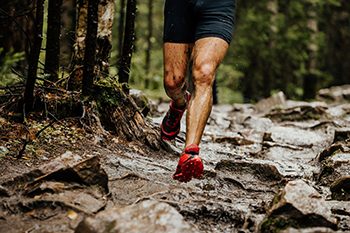
Finding the perfect pair of running shoes is essential for a comfortable and injury-free running experience. When shopping for running shoes, consider support needs based on your foot's pronation, whether it is on the inside, outside, or neutral. This determines if you require stability or neutral shoes. Pay attention to key elements of the shoe's upper, including the ankle collar, heel counter, saddle, and toe box, ensuring they provide proper support without causing irritation. Cushioning is another important factor, with options like max, mid, and light-cushioning. When it comes to sizing, choose a shoe that is a half size larger than your actual foot size to allow a thumb's width space between your longest toe and the shoe's end. This extra room reduces friction, minimizes the risk of blisters, and accommodates foot swelling during runs. For help in determining the right type of running shoe, it is suggested that you schedule an appointment with a podiatrist to evaluate your foot, stride, and gait, as well as treating any existing foot problems.
If you are a runner, wearing the right running shoe is essential. For more information, contact one of our podiatrists from Riznyk Podiatry. Our doctors can provide the care you need to keep you pain-free and on your feet.
Choosing the Right Running Shoe for Your Foot Type
To increase performance and avoid the risk of injury, it is important to choose the right running shoe based on your foot type. The general design of running shoes revolves around pronation, which is how the ankle rolls from outside to inside when the foot strikes the ground.
If you have any questions please feel free to contact our office located in Orchard Park, NY . We offer the newest diagnostic and treatment technologies for all your foot and ankle needs.
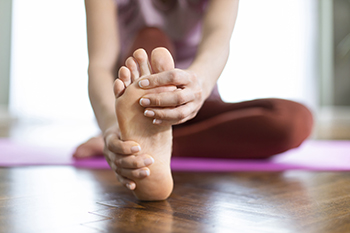
Pain in the big toe can be attributed to various causes, including arthritis, fractures, and gout. While most cases are manageable with conservative remedies, certain conditions like sesamoiditis may necessitate more specialized treatment. Arthritis, specifically hallux rigidus, is a common culprit, often affecting individuals over the age of 50, particularly women. Ingrown toenails can also lead to discomfort when toenails are cut too short or improperly. Gout, characterized by the buildup of uric acid in joints, frequently targets the big toe joint. Turf toe, a sports-related injury resulting from repetitive bending or jamming, is more prevalent among athletes on artificial turf. Sesamoiditis, common in runners and ballet dancers, results from inflammation of tendons around the sesamoid bones below the big toe. Toe fractures are commonplace due to various activities or accidents. Bunions, deformities at the base of the big toe, can cause discomfort and joint inflammation. Other potential causes encompass nail infections, Raynaud's disease, Morton's neuroma, and rheumatoid arthritis. If you have unexplained, persistent big toe pain, or if it is worsening, it is suggested that you schedule an appointment with a podiatrist for diagnosis and treatment.
Toe pain can disrupt your daily activities. If you have any concerns, contact one of our podiatrists of Riznyk Podiatry. Our doctors can provide the care you need to keep you pain-free and on your feet.
What Causes Toe Pain?
Most severe toe pain is caused due to a sports injury, trauma from dropping something heavy on the toe, or bumping into something rigid. Other problems can develop over time for various reasons.
Toe pain can be caused by one or more ailments. The most common include:
When to See a Podiatrist
Diagnosis
In many cases the cause of toe pain is obvious, but in others, a podiatrist may want to use more advanced methods to determine the problem. These can range from simple visual inspections and sensation tests to X-rays and MRI scans. Prior medical history, family medical history, and any recent physical traumatic events will all be taken into consideration for a proper diagnosis.
Treatment
Treatments for toe pain and injuries vary and may include shoe inserts, padding, taping, medicines, injections, and in some cases, surgery. If you believe that you have broken a toe, please see a podiatrist as soon as possible.
If you have any questions please feel free to contact our office located in Orchard Park, NY . We offer the newest diagnostic tools and technology to treat your foot and ankle needs.
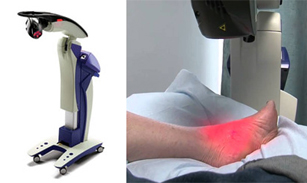
MLS, or Multiwave Locked System laser therapy, is an advanced and non-invasive medical technique that utilizes laser light to stimulate the body's natural healing processes. The therapy involves the use of dual wavelengths of light to penetrate tissues, reducing pain and inflammation while accelerating the healing of damaged cells. MLS laser therapy finds applications across various medical fields. It is often employed to address chronic and acute musculoskeletal conditions, such as arthritis, tendonitis, and sports-related injuries. The therapy works by improving blood flow to the affected area and promoting the production of endorphins, the body's natural painkillers. This leads to reduced pain, increased mobility, and enhanced tissue repair. In addition to pain management, MLS laser therapy is utilized in wound healing, post-operative recovery, and foot conditions. Its non-invasive nature and minimal side effects make it a valuable option for those seeking relief from various medical conditions. Understanding the definition and applications of MLS laser therapy sheds light on its significance in modern healthcare, offering an alternative approach to pain relief and healing. If you are interested in learning more about MLS laser therapy to treat your foot condition, it is suggested that you consult a podiatrist who can determine if this treatment method is right for you.
MLS Laser Therapy is a successful alternative for treating any pain you may be experiencing related to certain podiatric conditions. If you are interested in MLS Laser Therapy, consult with one of our podiatrists from Riznyk Podiatry. Our doctors will assess your condition and provide you with quality foot and ankle treatment.
MLS Laser Therapy
Multiwave Locked System (MLS) Laser Therapy is a patented, FDA-cleared technology that helps relieve pain and inflammation from a number of podiatric conditions, including:
MLS Laser Therapy is an ideal alternative to surgery and prescription medication, as it has no negative side effects and encourages accelerated healing. Among its many clinical benefits, MLS Laser Therapy also:
If you have any questions, please feel free to contact our office located in Orchard Park, NY . We offer the newest diagnostic and treatment technologies for all your foot care needs.
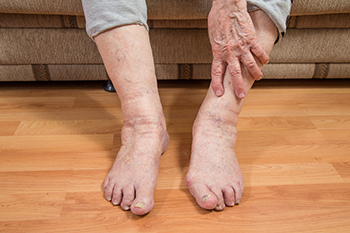
Red feet in the elderly can be a symptom with a myriad of potential causes. One primary contributor is reduced circulation, a common age-related issue that compromises blood flow to the extremities. Chronic venous insufficiency, where weakened veins struggle to return blood to the heart, may result in redness in the feet due to pooling blood. In some cases, medications or medical conditions affecting blood vessels can contribute to this discoloration. Additionally, inflammatory conditions like arthritis or infections might manifest as redness in the feet. Diabetic complications, particularly peripheral artery disease, may also lead to diminished blood supply and red discoloration. A podiatrist needs to conduct a thorough assessment to accurately diagnose and address the root causes of red feet in the elderly. If you or someone you know has this foot condition, it is suggested that you visit a podiatrist who can offer appropriate treatment options.
Proper foot care is something many older adults forget to consider. If you have any concerns about your feet and ankles, contact one of our podiatrists from Riznyk Podiatry. Our doctors can provide the care you need to keep you pain-free and on your feet.
The Elderly and Their Feet
As we age we start to notice many changes in our body, but the elder population may not notice them right away. Medical conditions may prevent the elderly to take notice of their foot health right away. Poor vision is a lead contributor to not taking action for the elderly.
Common Conditions
Susceptible Infections
Diabetes and poor circulation can cause general loss of sensitivity over the years, turning a simple cut into a serious issue.
If you have any questions please feel free to contact our office located in Orchard Park, NY . We offer the newest diagnostic and treatment technologies for all your foot and ankle needs.
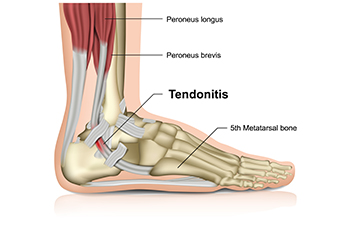
Achilles tendonitis, a common woe for runners, arises from inflammation in the strong tendon that connects the calf muscles to the heel bone. Typically linked to the runner's trifecta of too much, too fast, and too soon, recognizing symptoms of Achilles tendonitis is vital for timely intervention. These symptoms include initial stiffness that dissipates with warming up, in addition to pain and swelling near the heel. The runner may experience limited ankle flexibility during physical activities, and notice redness along the tendon. Other symptoms can include a distinct burning sensation, palpable scar tissue lumps, and an audible cracking or popping sound during ankle movement. Runners, constantly pushing their limits, are particularly prone to Achilles tendon injuries due to the repetitive stress involved in each stride. Speed and uphill training can increase the strain on the tendon. This can lead to overworking, tightening, and inflammation, which may result in Achilles tendonitis. If you are experiencing symptoms of Achilles tendonitis, it is suggested that you schedule an appointment with a podiatrist for a complete examination and treatment suggestions.
Achilles tendon injuries need immediate attention to avoid future complications. If you have any concerns, contact one of our podiatrists of Riznyk Podiatry. Our doctors can provide the care you need to keep you pain-free and on your feet.
What Is the Achilles Tendon?
The Achilles tendon is a tendon that connects the lower leg muscles and calf to the heel of the foot. It is the strongest tendon in the human body and is essential for making movement possible. Because this tendon is such an integral part of the body, any injuries to it can create immense difficulties and should immediately be presented to a doctor.
What Are the Symptoms of an Achilles Tendon Injury?
There are various types of injuries that can affect the Achilles tendon. The two most common injuries are Achilles tendinitis and ruptures of the tendon.
Achilles Tendinitis Symptoms
Rupture Symptoms
Treatment and Prevention
Achilles tendon injuries are diagnosed by a thorough physical evaluation, which can include an MRI. Treatment involves rest, physical therapy, and in some cases, surgery. However, various preventative measures can be taken to avoid these injuries, such as:
If you have any questions please feel free to contact our office located in Orchard Park, NY . We offer the newest diagnostic tools and technology to treat your foot and ankle needs.